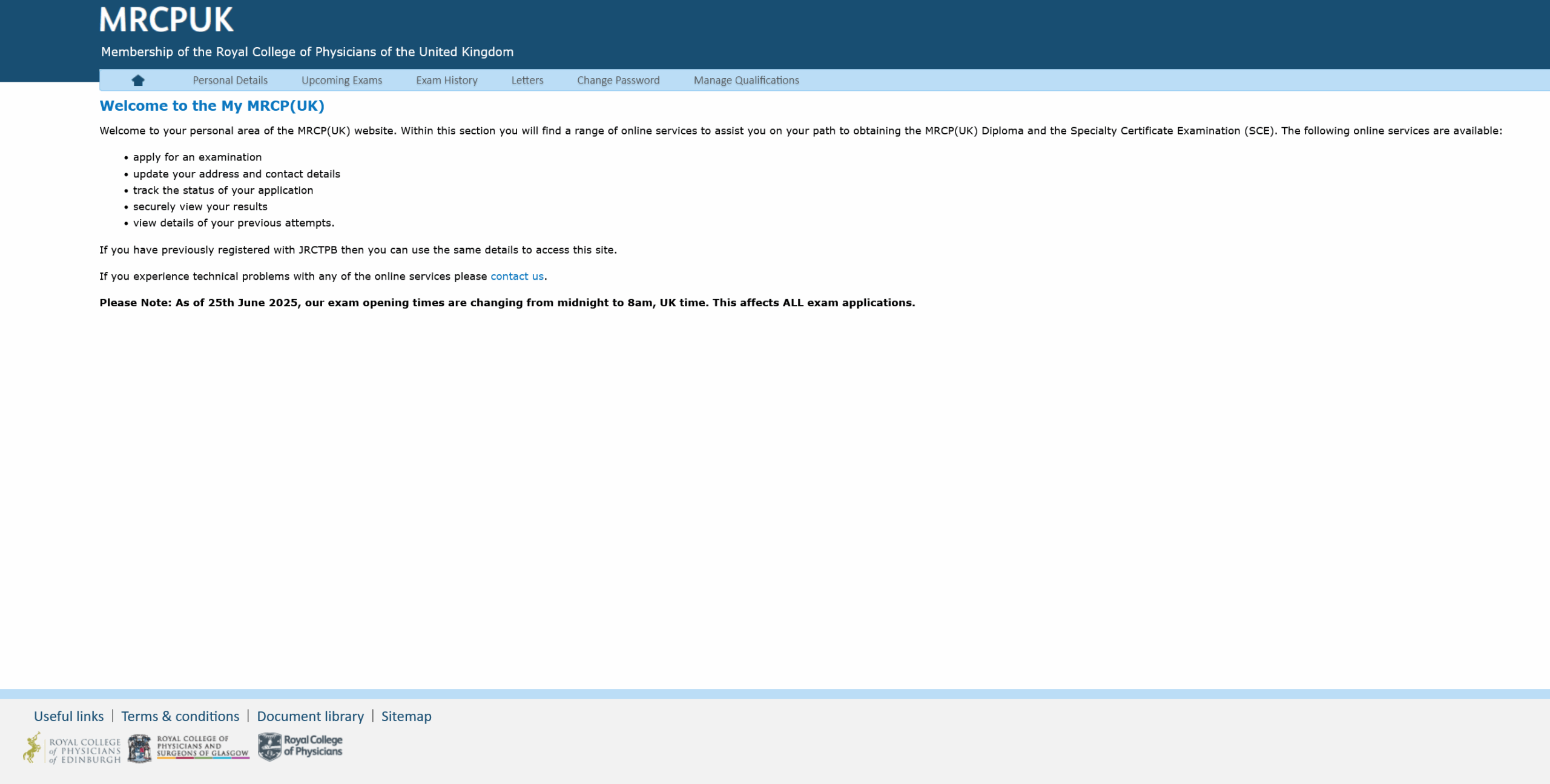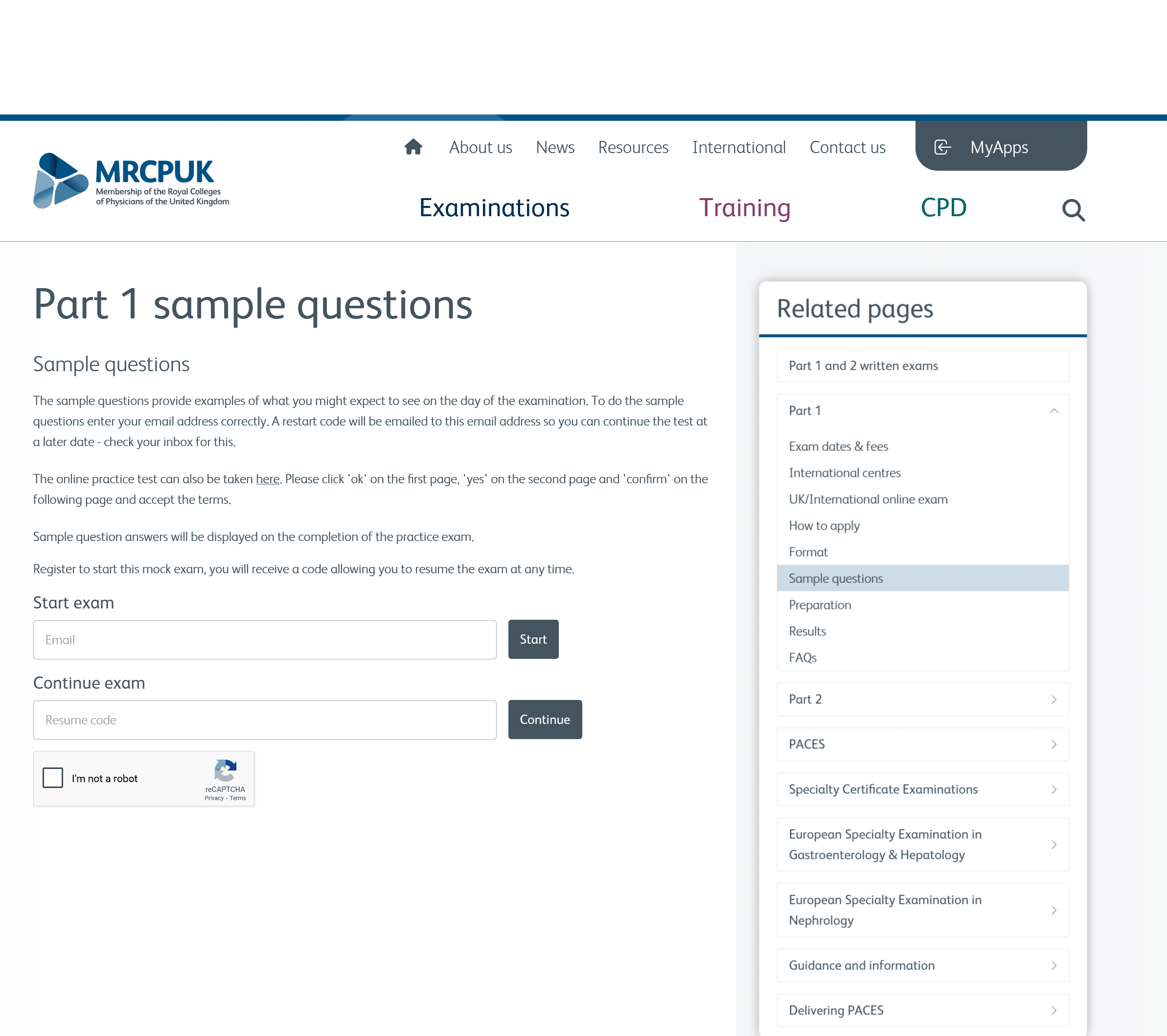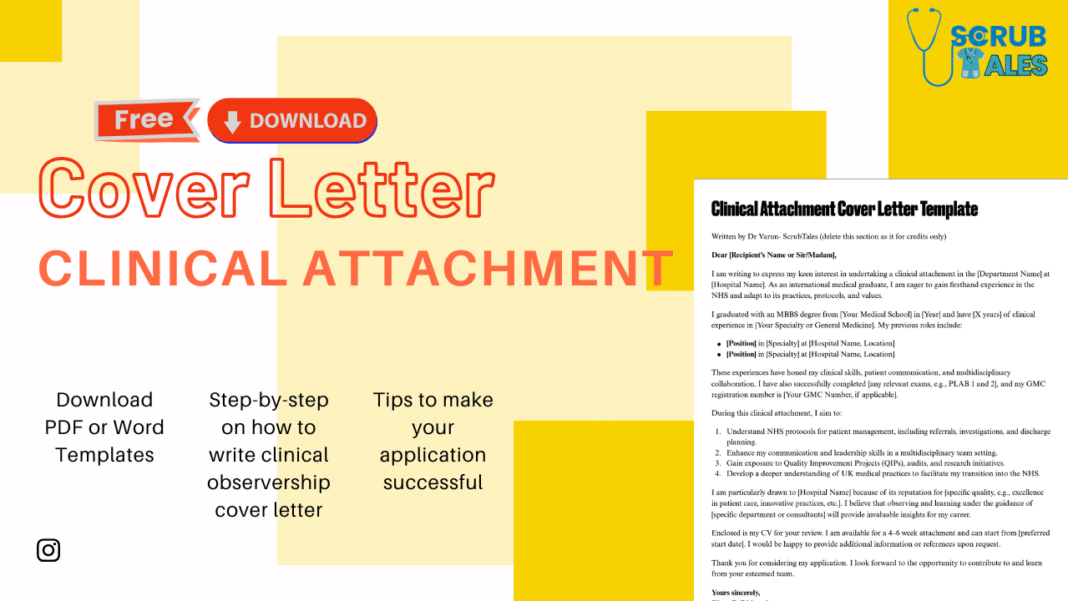For many junior doctors, passing MRCP Part 1 is either a step towards entering Internal Medicine Training (IMT) or a way to build a stronger portfolio when applying for NHS jobs.
It’s rarely about just ticking a box.
I was in the same situation: already working full-time in the NHS, balancing long shifts, on-calls, and study time.
I booked my MRCP Part 1 exam on 9th March 2025, sat the exam on 14th May 2025, and received my result on 13th June 2025.
That gave me just around two months to prepare — while managing my rota and regular life. It wasn’t ideal, but it was realistic. And I passed.

If you’re looking for a no-nonsense guide without false promises, this post is for you.
But if you’re also exploring where to look for your first NHS job, check out my post on the Best 5 places to find NHS jobs in 2025
MRCP Part 1: Why It Matters
For most junior doctors, passing MRCP Part 1 is more than just a qualification — it’s a necessary step to move forward in the UK medical system.
Whether you’re already working in the NHS or planning to apply from abroad, clearing the MRCP Part 1 exam helps unlock new opportunities.
Here’s why MRCP Part 1 is important for junior doctors:
To Apply for Internal Medicine Training (IMT)
If your long-term goal is to become a consultant physician in the UK, the MRCP Part 1 is one of the first exams that gets you closer.
While it’s not strictly required to apply for IMT, most successful candidates have it.
Passing MRCP Part 1 adds weight to your IMT application portfolio and improves your interview chances.
To Strengthen Your NHS Job Portfolio
Many junior doctors attempt the MRCP Part 1 even before applying for training posts.
Why? It improves your CV when applying for NHS non-training or trust-grade medical roles.
Passing this exam shows:
- Ability to handle UK-standard exams like the Best of Five (BOF) questions
- Knowledge aligned with UK clinical guidelines
- Commitment to working in UK healthcare

How to Book the MRCP Part 1 Exam: Step-by-Step
Booking your MRCP Part 1 exam isn’t complicated, but as a junior doctor, you’ll want to get familiar with the process early.
Booking early ensures you get your preferred exam date and location.

Step-by-Step Booking of the MRCP 1 Exam
10 minutes
Step 1: Create an MRCP(UK) Account
1. Go to the official MRCP(UK) website.
2. Create an account using your GMC registration number or medical degree details.
3. Upload any required ID or degree proof.
Step 2: Check MRCP Part 1 Exam Dates
1. The MRCP Part 1 exam is held three times a year: typically in January, May, and September.
2. Check the latest MRCP Part 1 exam dates and booking windows on the MRCP(UK) site.
3. Booking usually opens 4–5 months before the exam date and closes about 6 weeks before.
Step 3: Pay the Exam Fee
1. For 2025, approximate fees are:
– UK centres: £460
– International centres: £616
2. Fees must be paid online when booking.
Step 4: Choose Your Exam Centre
Options include:
1. UK test centres (Pearson VUE or written exam halls)
2. International MRCP Part 1 centres in locations like India, UAE, Singapore, etc.
As I was already in the UK, I was able to take the exam from the comfort of my own home.
Quick Notes for Junior Doctors:
- You don’t need to have GMC registration to sit the MRCP Part 1 — just a recognised primary medical qualification.
- Book as early as possible to secure your preferred exam date and location.
- Double-check ID and eligibility requirements before applying.
MRCP Part 1 Exam Format Explained
Before you start revising, it’s essential to understand the MRCP Part 1 exam format clearly.
Many junior doctors make the mistake of focusing only on knowledge, without preparing for the structure of the exam itself.
MRCP Part 1 Exam Structure
- Two papers in one day
- Each paper:
- 100 Best of Five (BOF) multiple-choice questions
- 3 hours per paper
- No negative marking
The total exam lasts approximately 6 hours, plus a break.
MRCP Part 1 Subject Areas
The exam covers a wide range of clinical medicine topics. Key areas include:
- Cardiology
- Respiratory Medicine
- Gastroenterology
- Neurology
- Endocrinology
- Rheumatology
- Nephrology
- Haematology
- Infectious Diseases
- Clinical Pharmacology & Therapeutics
- Statistics and Ethics
Important: Focus more on relevant topics like:
- NICE guidelines
- UK alcohol limits
- DVLA regulations
- Cancer screening protocols
Best of Five (BOF) Question Style
Every question in MRCP Part 1 follows the Best of Five format:
- One question stem
- Five possible answers
- One best correct answer
Even if more than one answer seems right, you must choose the single best answer according to UK clinical practice standards.
For the most realistic taste, try solving sample questions from the official MRCP website.

By understanding the MRCP Part 1 exam format early, you’ll make your revision much more focused and efficient.
Coming up next: the best study resources for MRCP Part 1 — the tools that actually helped me pass.
Best Study Resources for MRCP Part 1: Spotlight on Pastest
When preparing for the MRCP Part 1 exam while working full-time in the NHS, having the right revision tools makes all the difference.
Personally, I focused heavily on one question bank that made a major impact—here’s what I used and why it worked so well:
Pastest MRCP Part 1 Q-Bank – My Go-To Resource
- Why it stood out: With over 5,400 Best of Five questions, 600+ topic summaries, past papers, multimedia content, and an intuitive mobile app, Pastest provided comprehensive coverage tailored to the real exam format.
- Pricing (UK): £89.99 for 3 months, £139.99 for 6 months, £169.99 for 12 months of Pastest. Since I had just two months, I opted for the 3-month plan.
- Extras: If you want to supplement Qbank questions with video teaching, Pastest’s “MRCP Part 1 Exam Essentials” course (20 high-yield videos + Q&A sessions) is available separately for £199.99.

I credit Pastest as a key reason I passed in two months—it kept my revision focused, balanced theory with practice, and closely mimicked the exam format.
Along with Q-banks and books, CPD and clinical courses can strengthen your overall portfolio if you are planning for a job first.
Take a look at my list of Free CPD courses for NHS Trac applications for inspiration.
Other Question Banks (Optional Comparisons)
- Passmedicine MRCP Part 1
- Includes 5,100 BOF questions and 3 full-length mock exams.
- Subscription costs £35 for 4 months or £45 for 6 months.
- While I used this early on for performance tracking and revision intensity, its question volume felt slightly less structured than Pastest.
Recommended Books
- The only MRCP notes you will ever need– This is the only book I used. Although it can be bought, I believe there is a free version out there.
- Kalra’s Essential Revision Notes for MRCP – concise summaries ideal for final review.
- Oxford Handbook of Clinical Medicine – great to clarify grey areas during question feedback.
- I didn’t deep-dive into textbooks—my focus remained on Pastest, with books for quick topic clarity.

Essential Free Resources
- NICE Guidelines – crucial for understanding UK-specific clinical protocols.
- Geeky Medics – excellent for refreshing exam-style clinical skills.
- MRCP(UK) Sample Questions – available free from the MRCP(UK) website.
My Resource Strategy
- Core study tool: Pastest Qbank → steady daily question practice.
- Support reads: Mainly The Only MRCP Notes You Will Ever Need book. You can also try Kalra’s + Oxford Handbook as needed.
- Mock practice: Added Passmedicine simulated exams to track progress.
- UK-content immersion: NICE guidelines & UK-specific topics through question feedback.
Here’s a quick comparison if you want to decide:
MRCP Part 1 Q-Bank Cost Comparison
| Provider | Plan | Duration | Cost (UK GBP) | Key Features |
|---|---|---|---|---|
| Pastest | Core Q-Bank | 3 months | £89.99 | 5,400+ BOF questions, mobile app, multimedia content |
| Core Q-Bank | 6 months | £139.99 | Extended access, same features | |
| Core Q-Bank | 12 months | £169.99 | Longest access, includes past papers | |
| “Exam Essentials” add-on | N/A | £199.99 | 20 high-yield video modules + 10 Q&A sessions | |
| Passmedicine | MRCP Part 1 Q-Bank | 4 months | £35 | 5,100+ BOF questions, 3 mock exams |
| MRCP Part 1 Q-Bank | 6 months | £45 | Same content with longer access |
Bottom line: Use one top-quality MRCP Part 1 question bank (such as Pastest) as your foundation. Supplement with reading resources and free UK-specific tools.
Avoid spreading yourself thin across multiple subscriptions—focus and consistency win.
My 2-Month MRCP Part 1 Study Plan (While Working Full-Time NHS Job)
One of the most common questions junior doctors ask is:
“How long to prepare for MRCP Part 1 while working full-time?”
For me, two months was enough — but it wasn’t easy.
Below is exactly how I structured my time while working full-time NHS shifts.
Best Preparation Tip for MRCP 1
- I studied from ‘The Only MRCP Notes You Will Ever Need’ book for each subject first, then moved to Pastest to solve questions for that subject.
- Using ChatGPT: I would often take screenshots of Pastest questions and give them to ChatGPT to answer and explain.
- I’d also ask ChatGPT to make key points into what I called my recall list for each subject.
- Once done with a subject, I’d get ChatGPT to give me the notes for that subject in PDF format, take a screenshot of it, and save all these screenshots organised by category in my phone for easier revision.

Important note: Avoid using image generation for notes as it often distorts the content.
Furthermore, I also asked ChatGPT to create a study schedule for me, taking into account my exam date and the amount of time I want to allocate.
Trust me, it works amazingly!
How I Split My Study Time
- Total Prep Duration: 9th March 2025 – 14th May 2025
- Average Daily Study:
- 1–2 hours on normal days
- 4–5 hours on days off
- Focus:
- 80% Question Bank (Pastest MRCP Part 1)
- 20% Review Notes + Books
Weekly MRCP Part 1 Study Schedule Example
| Week | System Focus | Main Activity |
|---|---|---|
| 1–2 | Cardiology, Respiratory | Question Bank + NICE Guidelines |
| 3–4 | Gastro, Endocrine, Rheumatology | Question Bank + Notes |
| 5 | Neurology, Nephrology | Focused revision + mocks |
| 6 | Haematology, Infectious Disease | Mock exams + weak topics |
| 7 | Full syllabus review | Past papers + revision |
| 8 | Final mocks + rest days | Exam simulation + recovery |
Tips for Preparing for MRCP Part 1
Preparing for the MRCP Part 1 exam has its own challenges.
You’re not just revising medical knowledge — you’re adjusting to UK-specific guidelines, exam styles, and managing full-time NHS work.
Here are some key tips based on what helped me:
Focus on UK-Specific Guidelines
Candidates often lose marks by relying on knowledge from their home country’s medical system.
In MRCP Part 1, the correct answer is based on UK practice.
Make sure you revise:
- NICE Guidelines (cancer screening, hypertension, diabetes management)
- UK alcohol limits
- DVLA regulations
- NHS emergency protocols
Prioritise High-Yield Systems First
Based on my experience and what many question banks reflect, the systems that appear most often in MRCP Part 1 Best of Five questions include:
- Cardiology
- Gastroenterology
- Neurology
- Endocrinology
Don’t spend too long on minor topics like Dermatology or Psychiatry until the final weeks.
Personally, I skipped Clinical sciences and genetics as I did not have enough time.
Don’t Ignore Mock Exams
Mock exams simulate the real exam experience.
- Aim to start full mock exams at least 3 weeks before the actual exam date.
- Track your scores and time management — I noticed improvement from 55% to 65% in my final weeks.
If you score above 65% in Pastest, you will likely achieve the same or a higher score in the actual exam.
That is how realistic the questions from Pastest are.
Be Consistent, Not Perfect
Especially if you’re balancing MRCP Part 1 preparation with a full-time NHS rota:
- Don’t panic if you miss a day.
- Focus on maintaining momentum rather than aiming for 100% coverage.
- Consistently doing 20–30 Best of Five questions per day is better than sporadic cramming.

Use One Main Resource — Don’t Spread Yourself Thin
For me, using just Pastest MRCP Part 1 as my primary question bank kept things simple.
Avoid juggling too many books and apps. One focused resource beats multiple half-used ones.
Building a solid portfolio is crucial — it encompasses your exam scores, clinical attachments, teaching experiences, and cover letters.
Grab my NHS clinical attachment cover letter template to help with that.
Mock Exams and Final Preparation for MRCP Part 1
Many candidates underestimate the importance of mock exams when preparing for the MRCP Part 1.
Practising questions is one thing — but sitting a full-length, timed exam helps you get used to the real thing.
Here’s how I approached my final preparation:
When to Start Mock Exams
- I began full MRCP Part 1 mock exams around 3 weeks before my exam date.
- My first few attempts felt rough: scoring around 55–58%.
- By the final week, I was consistently reaching 65–70% in mocks.
Where to Find Good Mock Exams
- Pastest MRCP Part 1 Qbank: Includes full-length timed mocks.
- Passmedicine MRCP Part 1: Also offers mock exams — good for checking performance but I mainly used this as backup.
- MRCP(UK) Sample Questions: Available free on the official MRCP(UK) website for practice.
What I Learned from Mock Exams
- Time Management Is Key: Don’t spend more than 45–60 seconds per question. Move on if unsure and come back later.
- Stamina Matters: Two papers in one day is tiring. I simulated the full exam at least twice before my real exam.
- Don’t Panic Over Scores: My actual exam felt harder than mocks. Many candidates report this. Focus on consistency, not perfection.
Final Week Preparation Tips
- Focus only on reviewing weak areas — don’t try to learn new topics in the last few days.
- Stick to Pastest question bank revision and mocks.
- Take one full day off before the exam to rest.
My Results and Final Thoughts on MRCP Part 1
After two months of preparation, working full-time in the NHS while revising daily using Pastest MRCP Part 1 question bank, here’s how things turned out:
- Exam Date: 14th May 2025
- Results Announced: 13th June 2025
- My Score: 596
- Pass Mark: 540
Was it easy? Definitely not. But was it doable while working full-time? Yes — as long as you stay consistent.

Key Takeaways
- Start early if possible: Two months was enough for me, but three to four months is a safer timeline, especially if your rota is busier.
- Use one main question bank: I relied almost completely on Pastest — focusing on too many resources just wastes time.
- Do full mock exams: They really help with time management and build your confidence.
- Focus on UK-specific content: UK guidelines, BOF-style thinking, DVLA rules — these matter more than textbook knowledge alone.
Should You Book MRCP Part 1?
If you’re looking to apply for Internal Medicine Training (IMT) or want to strengthen your NHS job portfolio, I’d say:
Yes. Go for it.
Even if you don’t pass the first time, preparing for MRCP Part 1 sharpens your clinical reasoning in line with UK standards.
That’s valuable both for your day-to-day NHS work and for long-term career progression.
Once you’ve passed MRCP Part 1, your next goal may be to apply for IMT.
However, if you are looking for GP through MSRA, I’ve shared a guide on filling out the CREST form for MSRA, which may be helpful.
If you have any questions, feel free to ask them in the comments — I’m happy to help fellow doctors navigate their MRCP journey.


